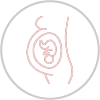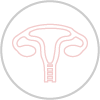Urinary Incontinence is surprisingly common. The Bladder & Bowel Foundation estimate that one in four of us will have a problem with bladder control at some time of our lives. The NHS estimates that between 6-8 million people in the UK currently have some degree of urinary incontinence.
Incontinence can have a major impact on your quality of life. The good thing to know is that it is a manageable and treatable condition. You really don’t have to suffer in silence.
Urinary Incontinence is a term that describes any accidental or involuntary loss of urine from the bladder. It is commonly associated with pregnancy, childbirth, surgery, menopause, obesity and a range of chronic conditions such as bronchitis, diabetes and spinal/nerve problems.
There are different types of incontinence with a number of possible causes. The most common being stress incontinence and urge incontinence.
Urgency is a sudden, strong and intense need to go to the toilet, often having to rush to get there. You hear it commonly referred to as an overactive bladder.
Severity may range from…..
- experiencing ‘key in the door’ syndrome
- increasing frequency of visits to the toilet day and night
- planning your day or activities around where there will be toilets
- staying inside more and more for fear of not making it in time whilst out and about.
Many women experience leaks on the way there, as they pull down their underwear, or total loss of control at any point. It can leave you feeling worried, side-tracked, embarrassed and simply fed-up. More than anything, it becomes extremely inconvenient and disruptive to your life.
In a properly functioning bladder, the bladder muscle (the Detrusor) remains relaxed as it gradually fills up. As it stretches to about half full, we get a feeling of wanting to pass urine. Most people can hold on after this initial feeling until a convenient time to go to the toilet arises. With an overactive bladder, the bladder may feel fuller than it actually is, it contracts too early and gives you strong urges of needing to empty its contents. If your pelvic floor muscles and sphincters are weak, they can’t withstand the force of the bladder contracting which then pushes out its contents before you are ready to go. The bladder can be irritated by infection, concentrated urine or caffeine. If the bladder is emptied more and more often then over time, it becomes smaller, holding less and less.
Urge incontinence is commonly the result of a long history of poor bladder habits linked to pregnancy and childbirth, stress and anxiety, sedentary lifestyles and a high intake of caffeine, smoking & alcohol. It also can be linked to Stroke, Parkinson’s Disease, MS and other chronic health conditions.
Physiotherapy for Urgency and Urge Incontinence:
- In depth assessment of gynaecological and obstetric history and current symptoms
- Physical examination and internal assessment (with consent)
- Teaching correct and effective pelvic floor muscle exercises
- Teaching abdominal exercises and buttock exercises
- Advice on healthy weight loss program, increased fitness program
- Advice on lifestyle: activity modification, exercise, bladder training
- Bladder re-training techniques
- Discussion of medication, liaise with GP



